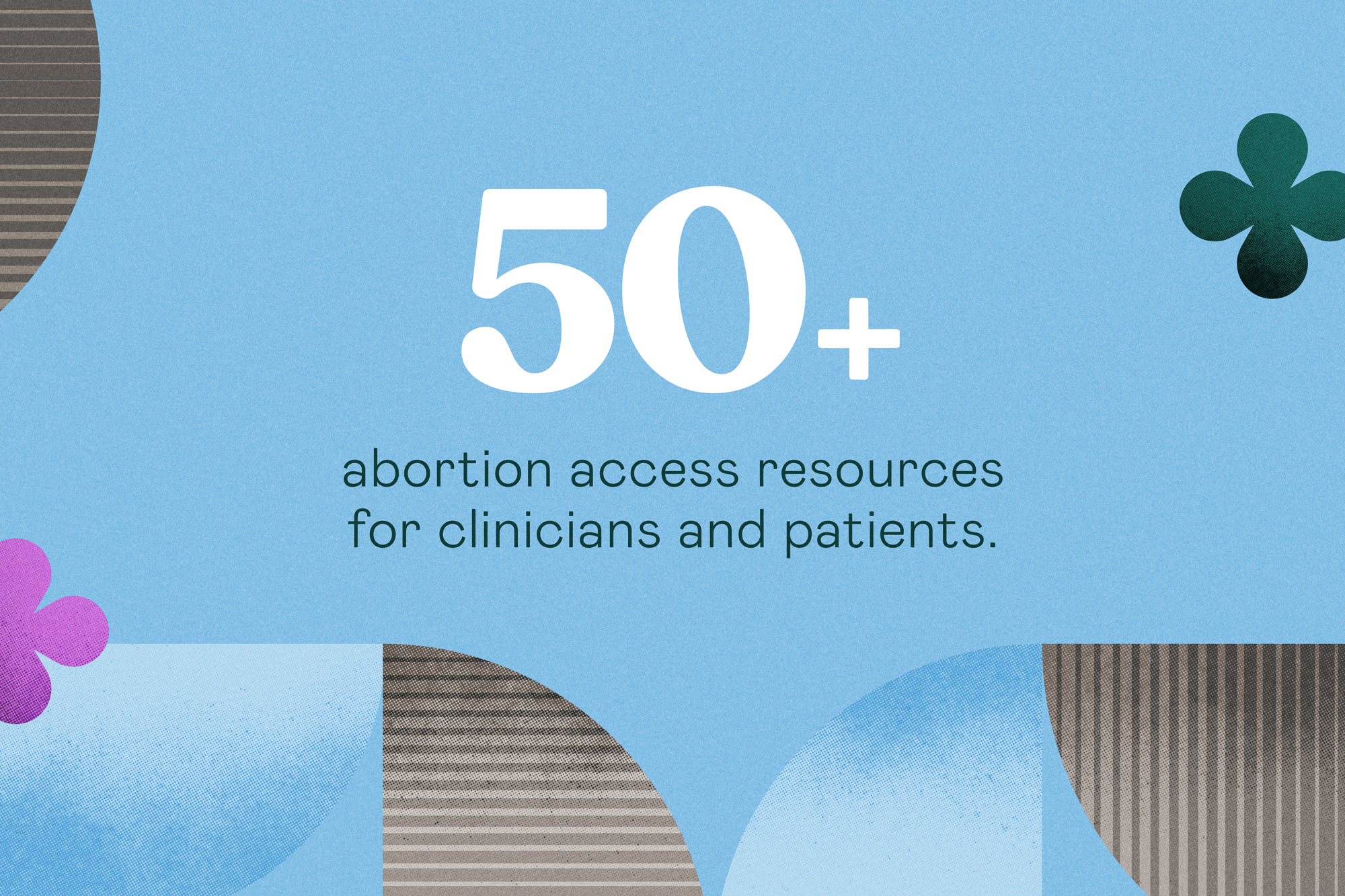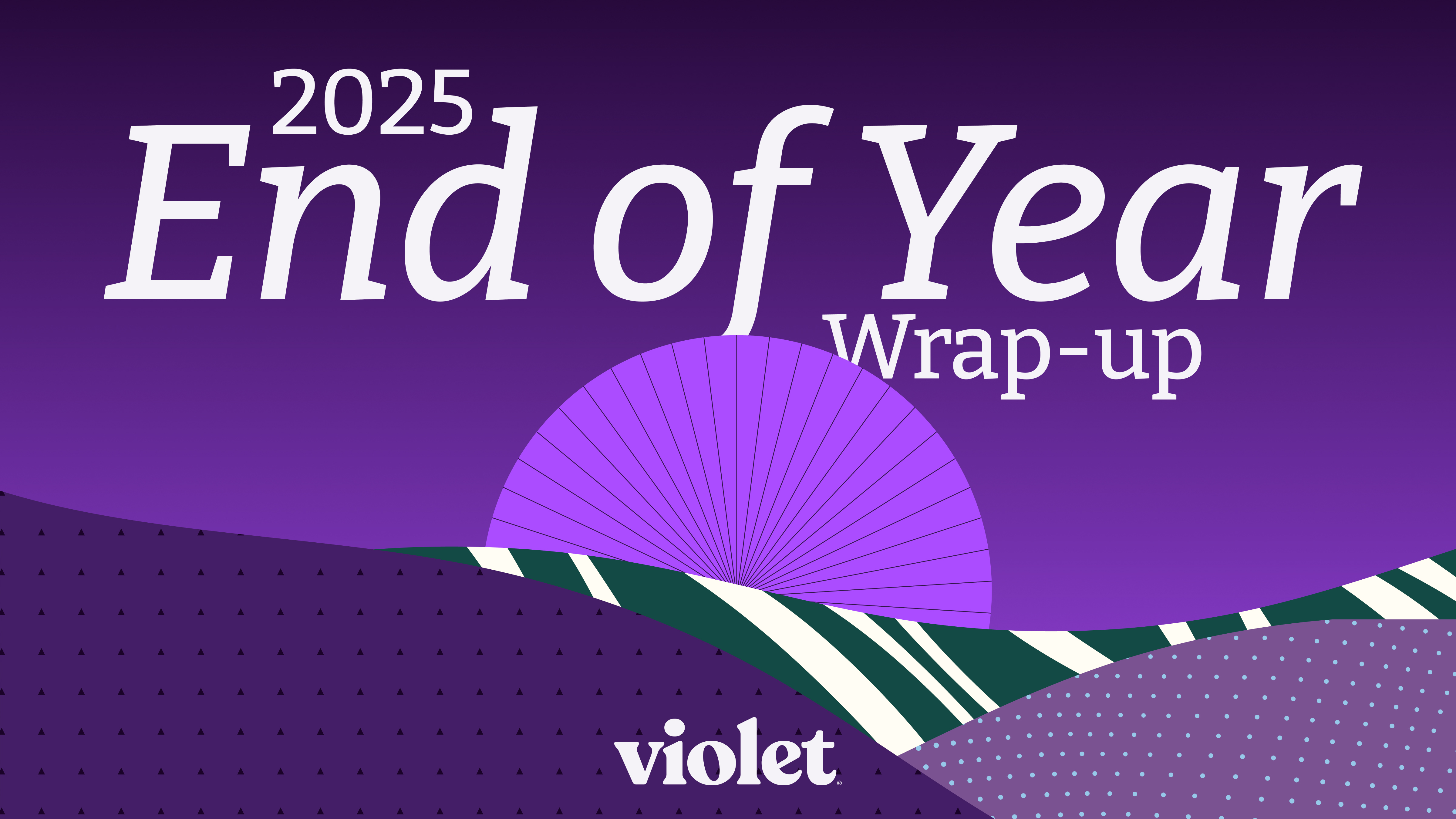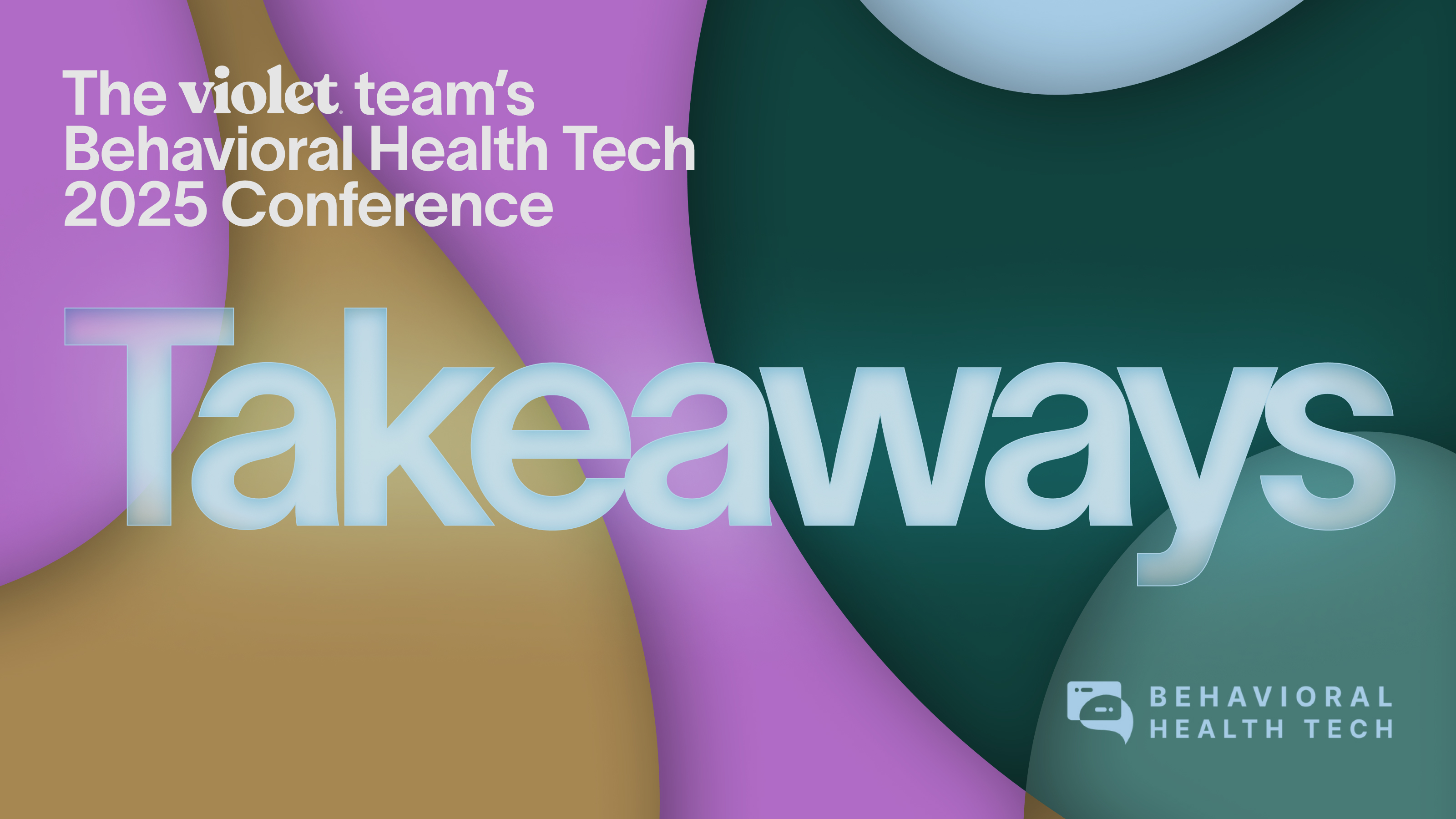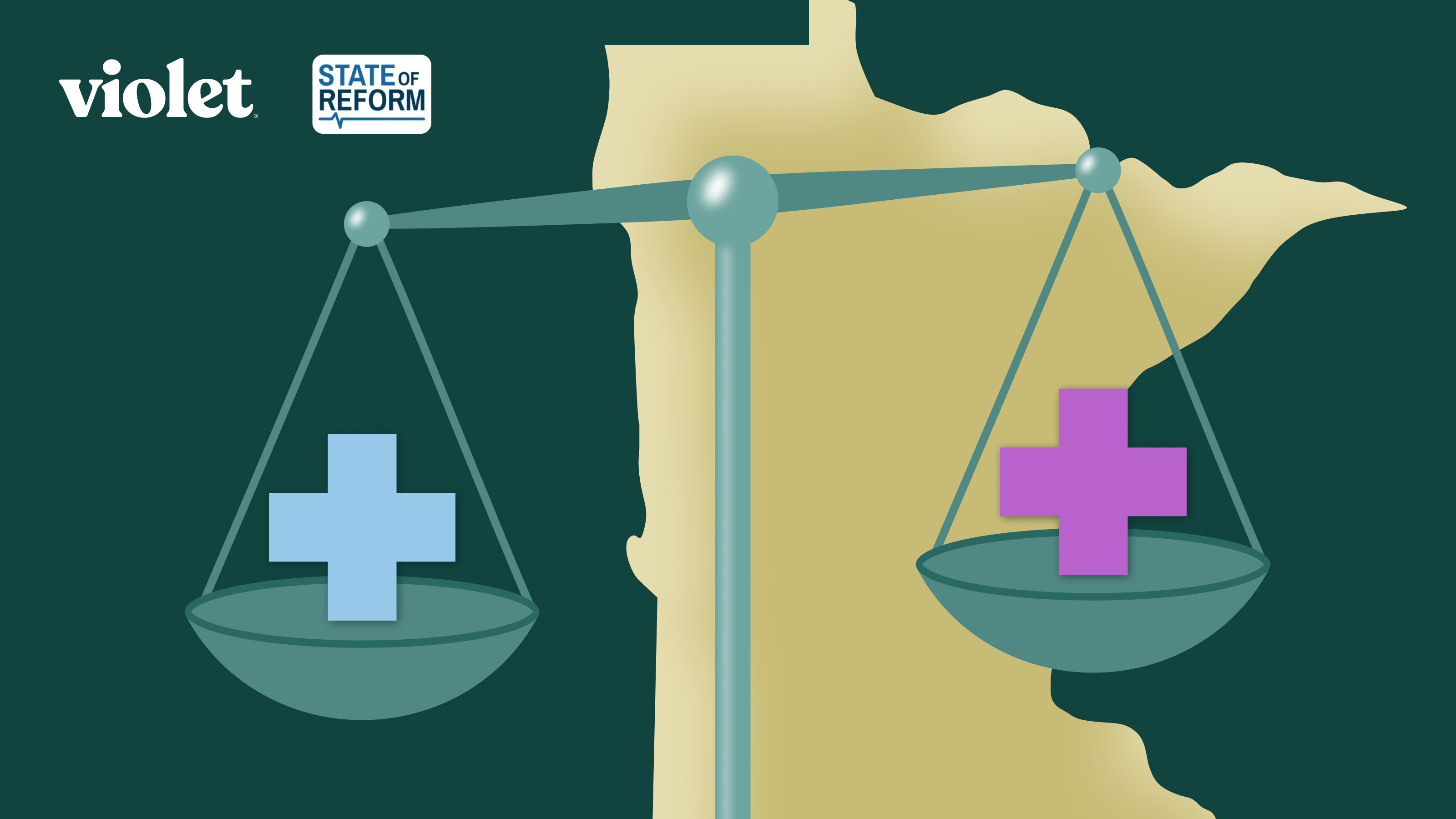When the Supreme Court decided to overturn Roe v. Wade, abortion access became the most restricted it’s been since the original decision was made in 1973. As of writing, 24 states have placed medically unnecessary restrictions on abortions—despite the fact that abortion is essential health care for hundreds of thousands of pregnant people in the U.S. each year.
As providers of cultural competence education, the Violet team recognizes abortion care as a vital part of inclusive, nonjudgmental health care for people of all genders, races, ages, and sexualities who can get pregnant. But not all of the providers who are theoretically able to perform in-clinic abortion care, from OB/GYNs to nurse-midwives to family medicine physicians, choose to offer it due to personal preference. Because of this, abortion care is even more limited than it is from state restrictions alone.
If you, like us, believe that people who can get pregnant should have support throughout their entire reproductive journeys—whether they decide to have children or not—then we’re here to help you provide that care in a way that’s both culturally congruent and mindful of the challenging legal landscape post-Roe.
Clinicians, please share Violet's Abortion Access Toolkit far and wide, and bookmark this page whenever you need guidance on how to navigate a post-Roe world for yourself and your patients.
The legal landscape for abortion access post-Roe.
Policy update resources: The ability to safely provide care, legally speaking, hinges on your state’s latest abortion policies. Explore these resources to understand your state’s laws right now.
- Guttmacher’s state policy tracker: The Guttmacher Institute regularly updates this tracker to keep people up to date on state laws.
- States where a physician must provide abortion care: This page focuses on what states currently require that a physician (rather than other types of clinicians) perform abortion care.
- State laws on medication abortion: This is where you can stay up to date on state laws around medication abortion in particular.
- Abortion Finder’s state-by-state abortion access policy guide: This page offers state-by-state guides on abortion laws and local options for financial support.
Cyber security resources: If you’re in a state with abortion restrictions and still want to support people’s access to care through other avenues, safeguarding your digital security is an important step. The same goes for the people you’re supporting.
- Abortion privacy guide: An expert guide on digital security when accessing information about abortion from the Digital Defense Fund
- Digital Security and Privacy Tips for Those Involved in Abortion Access: Additional tips from the Electronic Frontier Foundation.
- DeleteMe: The #1 privacy information removal service.
- Signal messaging app: End-to-end encrypted messaging.
- Telegram messaging app: Optional end-to-end encrypted messaging.
- DuckDuckGo: A search-engine substitute that doesn’t save your search history.
- Tor browser: A secure browser that encrypts your traffic and masks where it’s coming from.
- Virtual Private Network (VPN): No-logs VPNs (ProtonVPN & Tunnelbear) bypass your own internet service provider that doesn’t keep track of your activities.
- Euki app: A secure app for period tracking and other reproductive health information.
Legal resources: The following resources are helpful when faced with possible criminalization as a provider or a patient accessing care.
- Confronting Pregnancy Criminalization: National Advocates for Pregnant Women assembled this practical guide to help health care providers, lawyers, medical examiners, child welfare workers, and policymakers end the criminalization of pregnancy outcomes.
- The Repro Legal Helpline: If/When/How: Lawyering for Reproductive Justice runs this “warmline” so people with legal questions about self-managed abortion or judicial bypass can get a call back with answers.
- The Repro Legal Defense Fund: If/When/How also created this fund to cover bail and legal defense against the criminalization of self-managed abortion.
Cultural competence in abortion care.
Antiracist abortion resources: Beyond abortion care, the broader field of reproductive health care is impacted by historic and systemic racism. These guides and readings can help clinicians be antiracist abortion providers.
- Structures & Self: Advancing Equity and Justice in SRH: This curriculum from Innovative Education in Reproductive Health aims to teach clinical learners how to unpack the ways in which systems of power and structural oppression affect care.
- Mitigating Unconscious Bias in Healthcare: A workshop created for clinical providers by the New York State Family Planning Training Center.
- Reproductive Justice Briefing Book: This book provides foundational knowledge about the reproductive justice framework.
- Opportunities for antiracist work within midwifery: The American College of Nurse Midwives offers this list of strategies, books, trainings, and other information to support antiracism in midwifery.
- True Choice in Reproductive Care: This paper suggests the use of cultural humility and explanatory models to bring reproductive justice into primary care.
LGBTQ+ abortion resources: Abortion isn’t just a “women’s issue,” and considering it one excludes the many nonbinary individuals and trans men who access abortion care. Not only heterosexual people need abortions either. Here are some resources for LGBTQ+ and gender-affirming provision of abortion care.
- Improving Family Planning Services and Care for LGBTQ+ Clients Webinar: Training slides from a 2021 webinar created by the New York State Family Planning Training Center.
- Violet’s inclusive language guide: Inclusive language and communication guide for all health care staff.
- Using inclusive language around abortion care: This guide was put together by the ACLU.
- Trans-inclusive abortion care: This manual comes from the Fédération du Québec pour le planning des naissances.
- TransLash Guide to Trans Bodies, Trans Choices: A video and resource guide for operationalizing trans-inclusive policies and practices in an abortion setting.
- Queering Reproductive Justice: A Toolkit: The National LGBTQ Task Force compiled this toolkit to bring together advocates for the LGBTQ+ and reproductive justice movements.
Additional resources for abortion access.
Abortion care training resources: All of the resources below have information about residency, fellowship, and continuing education trainings for abortion care.
- The Ryan Program: An OB/GYN residency training program for abortion and family planning.
- Reproductive Health Education in Family Medicine’s (RHEDI) list of residency programs: Fully integrated abortion training for family medicine residency programs.
- The Reproductive Health Access Project's list of fellowship programs: One-year abortion-focused fellowships for board-certified/board-eligible physicians in family medicine.
- The Complex Family Planning Fellowship: Two-year complex family planning fellowships for board-certified/board-eligible OB/GYNs.
- Medical Students for Choice: A medical student-founded nonprofit with 220+ chapters focused on increasing access to abortion training in medical school.
- The Papaya Workshop: Trainings from Innovating Education in Reproductive Health that show how to perform manual vacuum aspiration abortion and other reproductive health care using papayas.
- The Abortion Provider Toolkit: A professional guide to support nurse practitioners, midwives, and physician assistants who currently provide or would like to provide abortion care.
Trauma-informed care resources: Providing trauma-informed care is especially important in the context of gynecologic and pelvic care, where the experiences can be triggering. These resources are good places to start.
- Providing Trauma-Informed Care in Family Planning Clinics Webinar: A webinar created by the Family Planning National Training Center.
- The PurpLE Health Foundation: A provider-led foundation offers medical schools and health systems trainings and consultations on trauma-informed care, as well as reproductive justice, health equity, and implicit bias.
- Trauma-Informed Toolkit for Health Care Providers: A toolkit courtesy of the Health & Medicine Policy Research Group.
- Best practices for trauma-informed pelvic exams: Guidelines from the Reproductive Health Access Project.
- ACOG: Caring for Patients Who Have Experienced Trauma: A committee opinion on trauma-informed care from the American College of Obstetricians and Gynecologists is a good place to start.
Free resources for patients: Whether or not you can and choose to provide abortions, these resources can help your patients access information and care.
- INeedAnA: A localized resource for up-to-date information on abortion access and abortion clinics.
- Abortion Finder: A search tool with over 750 verified abortion providers
- Patient education on abortion care: A resource published on UpToDate.
- Sam’s Medication Abortion Zine: An illustrated guide to medication abortion.
- Elena’s Aspiration Abortion Zine: An additional illustrated guide to abortion.
- National Network of Abortion Funds: This organization offers a searchable database of U.S. and international abortion funds and practical support groups.
- We Testify: An organization that centers the voices and stories of people who’ve had abortions, especially those from groups that face the most barriers to accessing care.
- Shout Your Abortion: A platform for reading and sharing personal stories about abortion.
- Plan C Pills: A digital guide to accessing abortion pills by mail.
- All-Options: Judgment-free counseling on all pregnancy options, including abortion care.
- Reprocare Healthline: A peer-based textline and hotline for medical information, emotional support, and other resources regarding self-managed abortion with pills.
- Exhale Pro-Voice: A peer-based textline for emotional support after having an abortion.
- M+A Hotline: An abortion provider-run hotline for medical questions around self-managed abortion with pills.
State restrictions and bans won’t stop abortion care from being needed and provided. And as long as health care is legislated and abortion care training is limited, it will fall on individual clinicians to seek out resources that enable them to provide that care.
We hope this list of resources, though not exhaustive, sets anyone who’d like to offer abortion care on the right path.

.svg)



.png)


.png)

